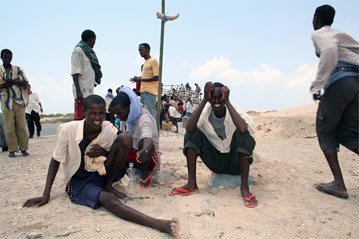Thousands gather in Somalia port for Gulf of Aden sailing season
Thousands gather in Somalia port for Gulf of Aden sailing season

BOSSASO, Somalia, August 30 - Some 3,000 Ethiopians have gathered in the dusty northern Somalia port of Bossaso, joining Somalis preparing to make the risky trip to Yemen across the Gulf of Aden during the annual sailing season.
The bad weather that kept smugglers' boats ashore between June and August is coming to an end and a fresh wave of people smuggling has already started. Those making the journey risk everything; at least 385 people died during the crossing through the first five months of this year.
UNHCR fears that this season will be as bad. "With insecurity on the rise in Mogadishu and tensions increasing in the Ethiopian Ogaden [region neighbouring Somalia], many more people might arrive in Bossaso," Guillermo Bettocchi, UNHCR's representative for Somalia, said during a visit here last week.
"Some humanitarian workers even report having seen a few Kenyans, Eritreans, Ugandans and Tanzanians in Bossaso, which means the town might become a hub for East Africans wishing to cross towards the Gulf countries," warned Bettocchi, who described the movement as a "human tragedy."
Bettocchi was in Bossaso to help launch a multi-agency action plan aimed at saving lives and providing basic assistance to those identified with international protection need. An advocacy campaign is also being launched here to warn people about the risks of crossing the Gulf of Aden and to stress that migrants have rights and should not be deported or returned to other areas of Somalia indiscriminately. It will also explain asylum procedures and who is eligible to pursue them.
Bettocchi said he was aware that a proportion of the Ethiopians in Bossaso fled their country for refugee-related reasons. "The advocacy campaign will make sure they know that they don't need to cross the sea because they can claim asylum and, where appropriate, be recognized as refugees and protected in Somalia."
The Ethiopians are easy to spot in run-down Bossaso. Many have sought shelter in a ruined building next to the harbour - it costs nothing, but they have to spend some of their precious reserves to use the latrines.
The difficult living conditions and scorching heat further weaken men and women who have travelled more than 1,600 kilometres from grinding poverty back home to reach Bossaso. But they remain determined to cross the Gulf of Aden, hoping to find better prospects on the other side.
Zahara and her brother Zarai have already made one attempt, but the boat broke down and the young Ethiopians were not refunded. "Now we look for small jobs and we sleep on the street because we want to save as much as possible for the crossing," she said, adding that she was aware of the risks but wanted a better life.
Making money to pay for the crossing is not easy here, but some find work as labourers in the port or as domestic workers or shepherds. The average charge to board a boat ranges from US$50-US$150, depending on the season.
The trip takes several days and passengers are always at risk of being robbed or having their belongings or even themselves thrown overboard if those in charge of the boats are at risk of capture by the Yemeni authorities.
Somalis account for about half of the people undertaking these perilous voyages. Most have fled conflict in the southern and central parts of the country, including the capital Mogadishu. Ali, a 25-year-old student from Mogadishu, said he faced danger and an uncertain future in Somalia.
"I need to build my future," he said, adding: "As long as Mogadishu is not peaceful, my future is in Saudi Arabia, where I can have a job and live without fearing for my life."
A Somali humanitarian worker in Bossaso explained that many of those considering making the trip were persuaded by middlemen to head to Bossaso, where the smugglers take over. "Smugglers are businessmen who compete with one another," he explained. "They are so eager to attract new customers that some have even disseminated videotapes in Bossaso to advertise life in Saudi Arabia in the teashops where Ethiopians gather."
The aid worker said he tried in vain to tell people that the promises were hollow and to warn them about the deadly risks they faced. "Once the migrant is stranded with 300 others on a small boat and beaten by a crew of four or five men high on drugs and holding guns, he discovers the true face of the smugglers, but it is too late," he said. "For smugglers, migrants are just merchandise."
The local authorities in Bossaso, which is surrounded by shantytowns built by displaced Somalis, cannot cope alone with the arrival of so many destitute people. Many of the would-be voyagers, having been robbed of their money, resort to begging in the streets.
The action plan launched last week aims to help the authorities. Aside from UNHCR, participants include the UN Children's Fund (UNICEF), the International Organization for Migration (IOM), the World Food Programme (WFP), the Office of the High Commissioner for Human Rights (OHCHR), the Office for the Coordination of Humanitarian Affairs (OCHA), the Danish Refugee Council and the Norwegian Refugee Council.
The plan aims to provide those considering making the trip with access to basic services such as water, sanitation and primary health care. Those who may require international protection will be directed towards relevant UN agencies and non-governmental organizations.
By Catherine Weibel in Bossaso, Somalia









